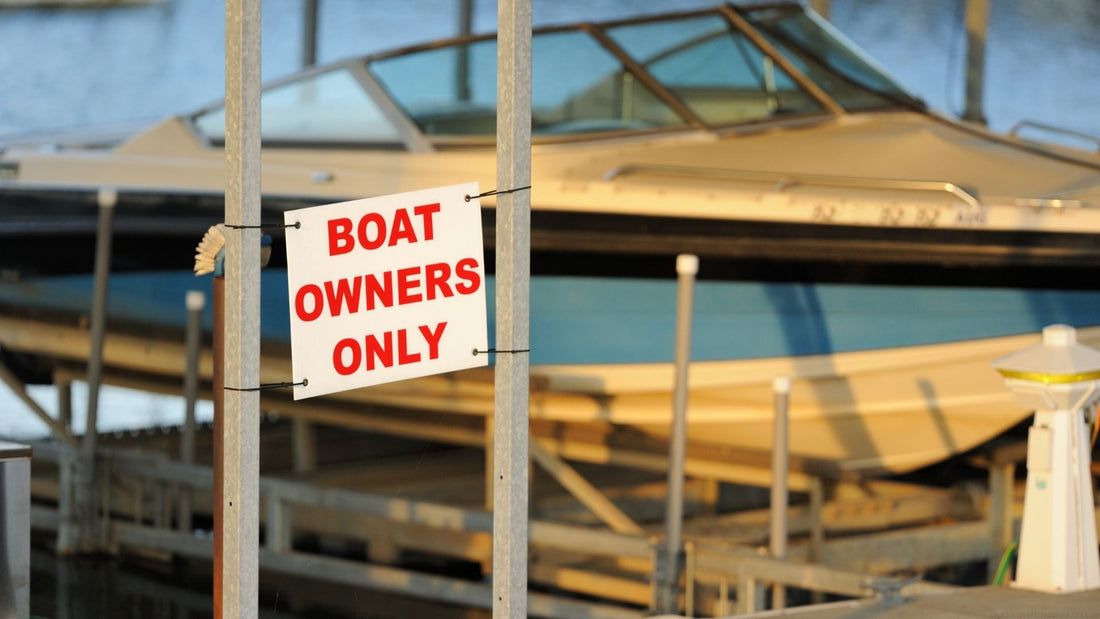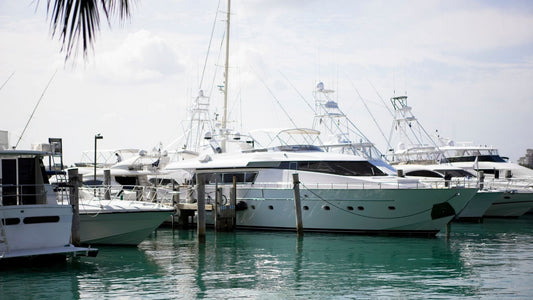
10 Things Every First-Time Boat Owner Should Know Before Hitting the Water
Nicholas HeislerShare
Owning a boat for the first time is a dream come true for many. The freedom of the open water, the thrill of mastering a new skill, and the ability to create unforgettable memories with family and friends-it's no wonder boating is such a popular pastime. But with that excitement comes responsibility.
Whether you're navigating inland lakes, coastal waters, or your local marina, every new boat owner needs to get a solid handle on the essentials. Too many first-timers jump in without knowing the basics-and end up making expensive, frustrating, or even dangerous mistakes.
To help you get started the right way, here are 10 things every first-time boat owner should know. These tips will save you time, money, and headaches-and make your time on the water safer and more enjoyable.
1. Learn The Local Boating Laws And Licensing Requirements
Boating regulations vary widely by state, and not knowing them can cost you in fines-or worse, put you and others at risk. As a first-time boat owner, one of your top priorities should be learning the rules of the water where you plan to operate.
Check with your state's boating agency or Department of Natural Resources to determine whether you need to register your vessel, obtain a boating license or safety certificate, or adhere to specific age or horsepower restrictions.
In many states, anyone born after a certain year must pass a certified boating safety course to operate a motorized vessel. Even if you're not legally required to take a course, doing so is one of the smartest moves a new boat owner can make.
2. Understand The True Cost Of Boat Ownership
The purchase price is just the beginning. Many first-time boat owners underestimate the recurring costs associated with boat ownership. Fuel, insurance, marina fees, seasonal storage, trailer maintenance, cleaning supplies, and general upkeep can quickly add up.
According to BoatUS, annual maintenance and storage can run anywhere from 10% to 20% of your boat's value per year. A few things to budget for:
- Fuel (often more expensive than car gas)
- Dockage or mooring fees
- Regular engine servicing
- Trailer registration and maintenance
- Boat insurance
- Replacement of safety gear and equipment
Plan your budget carefully and allow room for unexpected repairs or upgrades. Boat ownership is rewarding, but only if you go in with realistic expectations.
3. Take A Boater Safety Course (Even If It's Not Required)
Even if your state doesn't require one, a boater safety course is an essential investment in your confidence and competence on the water. These courses cover important topics like navigation rules, docking procedures, handling emergencies, understanding weather conditions, and more.
A safety course can also help you save on insurance premiums, as many companies offer discounts for completing certified training.
You can take an in-person class through your local marina, U.S. Power Squadron, or Coast Guard Auxiliary, or opt for an online course through organizations like BoatUS or NASBLA (National Association of State Boating Law Administrators).
4. Practice Launching, Docking, And Trailering-Before Your Big Trip
One of the biggest sources of stress for new boaters is launching and docking. These are precision tasks that require a mix of skill, patience, and calm nerves-especially when other boaters are watching at a crowded launch ramp.
Before your first "real" trip, spend some time practicing:
- Backing up your trailer in an empty parking lot
- Launching and retrieving the boat at a quiet ramp
- Docking slowly and using fenders correctly
- Tying basic boating knots like the cleat hitch
Don't rush. Confidence comes from repetition-and you'll save yourself a lot of embarrassment (and fiberglass repair bills) by learning in a low-pressure environment.
5. Know Your Boat's Systems And Required Maintenance
Your boat has a lot more going on beneath the surface than you might expect. Engine systems, bilge pumps, electrical wiring, fuel lines, and batteries all need regular attention-and neglecting even one component can ruin a boating day or cause long-term damage.
Familiarize yourself with:
- Pre-launch inspection checklists
- Oil and filter changes
- Fuel stabilizer use and fuel filter checks
- Bilge and livewell system basics
- Battery maintenance and charging
- Proper flushing procedures for saltwater use
Keep a log of all maintenance tasks and use your owner's manual (or YouTube) to learn the unique quirks of your specific boat model.
6. Always Check The Weather-And Respect It
Weather can change rapidly on the water, and many new boaters overestimate their boat's ability to handle wind, waves, or visibility issues. Before every outing, check a reliable marine forecast-not just your phone's weather app.
Recommended tools:
- NOAA Marine Weather Forecasts
- Windy or WindFinder apps
- Local boating weather alerts
Respect small craft advisories, and don't be afraid to cancel your plans if the weather looks questionable. One storm can turn an otherwise relaxing day into a rescue operation.
7. Stock Your Boat With Safety Gear And Essentials
U.S. Coast Guard regulations require specific safety equipment on board, but don't stop there. Being over-prepared is always better than the alternative.
Required gear often includes:
- U.S. Coast Guard-approved life jackets (one per person)
- Throwable flotation device
- Visual distress signals (day and night)
- Fire extinguisher
- Sound-producing device (like a whistle or horn)
Highly recommended add-ons:
- First-aid kit
- Extra dock lines and fenders
- Tool kit and spare parts
- Flashlight and extra batteries
- Sunscreen and drinking water
- Dry bag for valuables
Before every trip, double-check that all your gear is in good condition and easily accessible.
8. Practice Clean Boating And Environmental Responsibility
Clean boating isn't just a good habit-it's essential to preserving the waterways we all enjoy. First-time boaters often don't realize how easy it is to unintentionally pollute.
Here are a few simple clean boating practices:
- Use oil-absorbing pads in your bilge to prevent spills
- Choose eco-friendly, biodegradable cleaning products
- Never throw trash or fishing line overboard
- Pump out waste at designated stations
- Avoid sensitive areas like seagrass beds and nesting zones
Join programs like the Clean Boater Pledge or BoatUS Foundation's environmental initiatives to become part of the solution, not the problem.
9. Join A Community Of Boaters
Boating can be a steep learning curve, but you don't have to go it alone. Connecting with other boaters is one of the best ways to learn new tips, discover local destinations, and troubleshoot problems.
Ways to get involved:
- Join a local yacht or boating club
- Attend boat shows or marina events
- Subscribe to boating forums (e.g., The Hull Truth, iBoats)
- Follow boating influencers or YouTube channels
- Participate in social media groups specific to your boat type or location
Fellow boaters are often generous with their knowledge-and swapping stories over the dockline is part of the fun.
10. Have A Plan For Off-Season Storage And Winterization
What you do with your boat when you're not using it is just as important as how you use it. Especially in colder climates, improper storage or skipping winterization can cause serious damage to your engine, fuel system, and interior.
Common storage options:
- Wet Slip: Convenient but can be hard on your hull if not maintained
- Dry Stack: Good for small to mid-sized boats
- Trailered Storage: Ideal for DIYers or those on a budget
Learn more about your boat storage options in our related blog.
Winterization checklist:
- Drain and stabilize fuel
- Flush and fog the engine
- Remove electronics and valuables
- Cover the boat with a proper fitted cover
- Inspect the trailer and tires
If in doubt, hire a marine mechanic to winterize for you. The cost is far less than a cracked engine block.
Common First-Time Boat Owner Mistakes To Avoid
Even the most cautious new boaters make mistakes-but awareness helps you avoid the most costly ones:
- Forgetting the drain plug before launching
- Not checking the fuel level
- Tying dock lines incorrectly
- Overloading the boat with passengers or gear
- Ignoring local no-wake zones
- Leaving gear unsecured and letting it blow overboard
- Not having a float plan or telling someone your itinerary
When in doubt, go slow and ask questions. Boating is a lifelong learning experience.
Start Your Boating Journey the Right Way
Being a first-time boat owner is exciting, but it's also a responsibility that demands preparation, patience, and a commitment to safety. By learning the basics, respecting the water, and keeping up with your boat's needs, you'll build a solid foundation for a lifetime of enjoyment on the water.
Whether you're cruising the coast, casting lines on the lake, or just spending time anchored with friends, boating is better when you're prepared. Bookmark this guide, refer back to it often, and never stop learning. See you on the water!
When it comes to keeping your new boat clean, Captains Preferred has everything you need to wash and maintain every type of boat. Get 15% off your first order when you sign up for boater emails.




